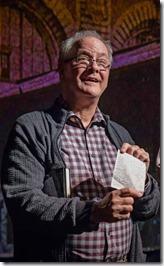
Compelling, inspiring source material weakened by uneven structure
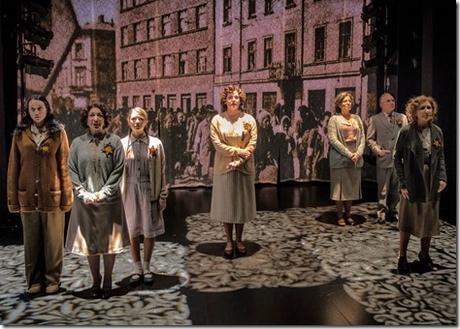
Review by Lauren Whalen
When Chicago Shakespeare Theater first commissioned The Book of Joseph , Barack Obama was still President and the horrors of Nazi Germany felt like a tragic, but distant, memory. Now, as immigrants in cities are being rounded up for deportation and groups are detained in airports nationwide, stories of the Holocaust feel more relevant than ever. This world premiere play, based on one man's family story - equal parts frustrating, satisfying and full of unanswered questions - has compelling, inspiring roots and is beautifully acted by a strong ensemble. Unfortunately, the odd narrative structure and overdone production values detract from the stunning root material.
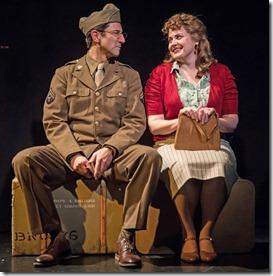
In many ways, Joseph Hollander's story is a tragically typical Holocaust tale. His family was exiled from their home and eventually relegated to Krakow's newly-designated Jewish ghetto. Meanwhile, Joseph pleaded with customs officials, First Lady Eleanor Roosevelt and Secretary of State Cordell Hull for sanctuary in New York City. The family exchanged letters, sometimes with brutal honesty but more often hiding the real truth. In other ways, Joseph's story is not typical. While most of Krakow's Jews were working-class, the Hollanders were wealthy. At the beginning of the play, Joseph secures travel vouchers and papers for the whole family's escape to Portugal - however, the only taker is Joseph's then-wife, as the rest of the family believes they'll be just fine and this too shall pass. This isn't the first escape opportunity they reject.
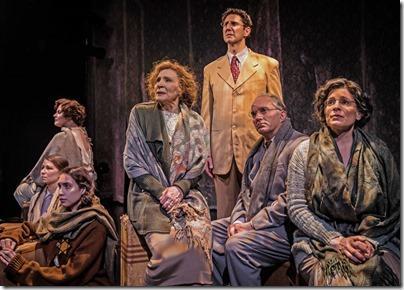

Joseph did get out before things got really bad, just as he intended. However, he reluctantly left his family behind and faced a whole new set of obstacles as a wannabe American. After Joseph divorced, married the woman who would become Richard's mother and had children, he never spoke of the Hollander family in Poland. The Book of Joseph does an excellent job of exploring the missing information - and because Joseph's letters to his family were never recovered, and Joseph himself is dead, there is a lot to fill in. The clumsy narrative, however, is where Hartman's adaptation falls very short. Though Chicago favorite Francis Guinanprovides admirable relatability as Richard, the piece's narrator, the entrance of his whiny adult son Craig is unnecessary and unwelcome. Actor Adam Wesley Brown tries his best, but Craig is thoroughly unlikable and detracts from the heart of Joseph's story. I applaud Hartman and Chicago Shakespeare for attempting a different direction, but a traditional narrative would have suited this adaptation far better. Additionally, director Barbara Gaines is fond of fog machines and lavish production values (including far too many projections), which just feel like audience manipulation.
It's a shame that the production isn't more solid, because the cast is fantastic. Besides Guinan, Sean Fortunatois stellar as central character Joseph Hollander. Through Fortunato, Joseph's intelligence, determination and wit are palpable and Joseph is utterly empathetic as a result. Other standouts include Patricia Laveryin the dual role of Joseph's long-suffering sister Dola and his second wife Vita, Glynis Bell as family matriarch Berta, and Ron E. Rains as Joseph's brother-in-law Salo. With a stronger, more straightforward script, the cast's remarkable abilities would have been further illuminated. As it is, The Book of Joseph is a flawed adaptation of a nuanced, realistic true story.
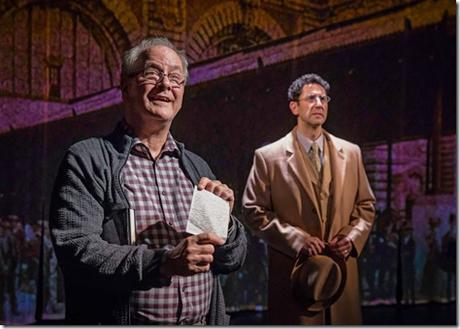
The Book of Joseph continues through March 5th at Chicago Shakespeare Theater, 800 E. Grand (map). Tickets are $48-$58 (patrons under 20: $20), and are available by phone (312-595-5600) or online through their website (check for half-price tickets at Goldstar.com ). More information at ChicagoShakes.com. (Running time: 2 hours 20 minutes, includes an intermission)
Photos by Liz Lauren
Francis Guinan (Richard Hollander), Sean Fortunato (Joseph Hollander), Glynis Bell (Berta Hollander, Miss Blaustein), Adam Wesley Brown (Craig Hollander), Amy J. Carle (Mania Nachtigall, Court Interpreter, Iris Spitzman), Mikey Gray (Lusia Wimisner, Movement Captain), Patricia Lavery (Dola Stark, Vita Fischman), (Salo Nachtigall, Court Officer, Stanley Diana, Arnold Spitzman), Gail Shapiro (Klara Wimisner, Felicja Hollander), Brennan Stacker (Genka Wimisner, Young Arnold Spitzman)
behind the scenes
Barbara Gaines (director, CST artistic director), Scott Davis (scenic design), Rachel Healy (costume design), Philip Rosenberg (lighting design), (projection design), Mikhail Fiksel (sound design), Miles Polaski (sound design), Richard Jarvie (wig and make-up design), Matt Raftery (associate director and choreographer), Adam Goldstein (dialect coach), Carrie Taylor (production stage manager), Sammy Brown (assistant stage manager), Bob Mason (artistic associate, casting director), Rick Boynton (creative producer), Criss Henderson (CST executive director), Liz Lauren (photographs)
Tags: 17-0214, Adam Goldstein, Adam Wesley Brown, Amy J. Carle, Barbara Gaines, Bob Mason, Brennan Stacker, Carrie Taylor, Chicago Shakespeare Theater, Criss Henderson, Francis Guinan, Gail Shapiro, Glynis Bell, Karen Hartman, Lauren Whalen, Liz Lauren, Matt Raftery, Mike Tutaj, Mikey Gray, Mikhail Fiksel, Miles Polaski, Navy Pier, Patricia Lavery, Philip Rosenberg, post, Rachel Healy, Richard Jarvie, Rick Boynton, Ron E. Rains, Sammy Brown, Scott Davis, Sean Fortunato
Category: 2017 Reviews, Chicago Shakespeare, Lauren Whalen, Navy Pier, New Work, World Premier

